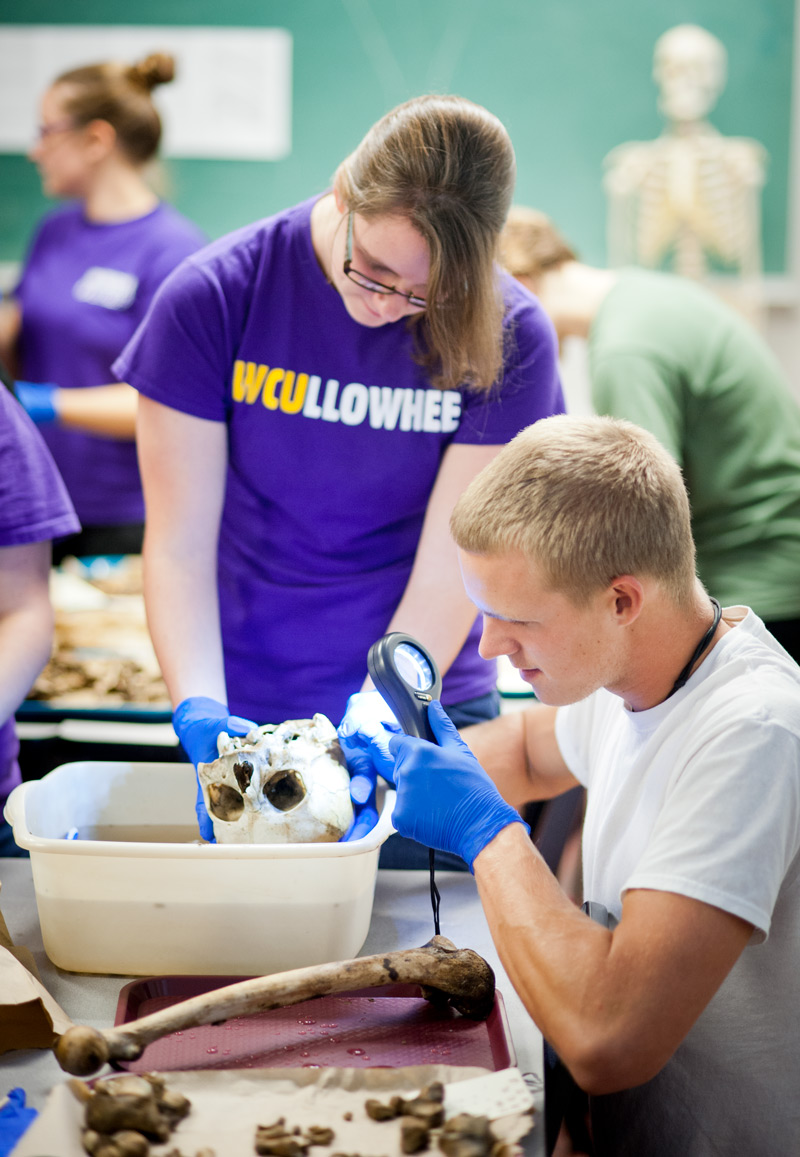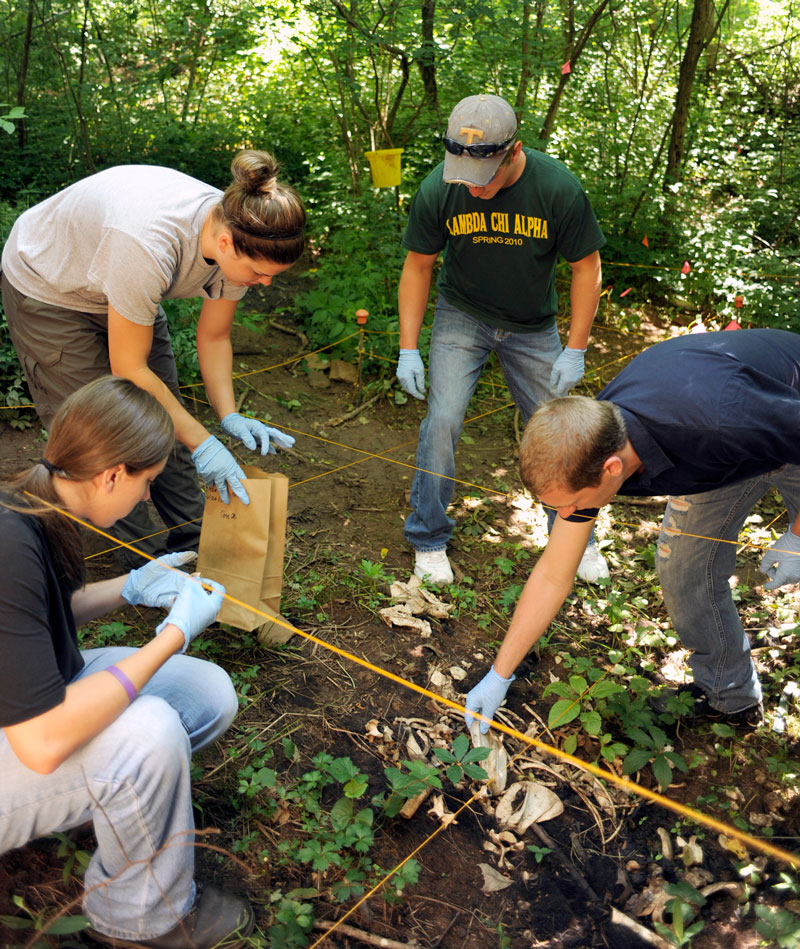Forensic Anthropology Program

Forensic Anthropology is the application of anthropological method and theory to matters of legal concern, particularly those that relate to the recovery and analysis of the human skeleton.
Here at WCU, our program offers a B.S. in Anthropology with a Forensic Anthropology Concentration, along with a Forensic Anthropology Minor.
The goal of WCU's forensic anthropology program is to provide our students with the education and skills needed to support their future careers in forensic anthropology or related fields such as death investigation, law enforcement, or medicine.
- Understand the function and role of forensic anthropology within the medicolegal system.
- Be able to perform a systematic search and recovery of a scene using the principles of forensic archaeology.
- Understand how bones grow and develop.
- Be able to identify each bone in the human body and locate associated characteristics and bony landmarks.
- Understand how and when to perform various skeletal analyses with an emphasis on theoretical strengths and weaknesses of each technique.
- Be able to generate a biological profile for an unknown set of human skeletal remains.
- Recognize the primary forms of bone trauma, and differentiate skeletal trauma from taphonomic modifications.
- Understand how to generate an estimate of the postmortem interval for a set of remains.
- Understand how forensic anthropologists can contribute to the positive identification of an unknown set of remains.
The major requires 36 hours as follows: Nine (9) hours of Anthropology Core courses, nine (9) hours of Anthropology Perspective courses, nine (9) hours of Forensic Anthropology Core courses specified for the concentration, and nine (9) hours of Anthropology Program Electives are required in the major.
Additional requirements for the major (42 hours)
To complete the program, 42 hours are required, including a second major, a minor,
or another approved program. Students must take at least 30 hours of coursework at
the junior-senior level at WCU to satisfy general degree requirements.
The minor requires 21 total hours with 15 credit hours of the following courses:
- ANTH 110 - Introduction to Archaeology (3 credits)
- ANTH 115 Introduction to Biological Anthropology (3 credits)
- ANTH 120 - Comparative Cultural Systems (3 credits)
- ANTH 251 - Introduction to Forensic Anthropology (3 credits)
- ANTH 300 - Human Osteology (3 credits; previously ANTH 264)
- ANTH 400 - Human Osteology Method & Theory (3 credits)
Additional requirements for the minor (3 credit hours):
6 hours of junior-senior level (i.e. 300/400 level) anthropology courses, Students may use up to 3 hours of Native American Studies (NAS) courses as program electives.
Forensic Anthropology FAQ
We are always happy to meet with prospective students, but our schedules are very busy. If you will be on campus and would like to meet with someone from Forensic Anthropology, please contact us at least two weeks prior to your visit.
See our eight semester plans for traditional students and transfer students.
If you are interested in workstudy for WCU's forensic anthropology program, our student worker handbook is available FANT workstudy.
In order to be part of our program here at WCU, all you need to do is become admitted to WCU, then declare either the Forensic Anthropology concentration Major, or Minor. We have no other specific requirements for admission to the forensic anthropology program.
The best advice is to get good grades, especially in your science and math classes. Biology, Anatomy, and Statistics are very important to forensic anthropology and having a background in them will give you an advantage. Additionally, consider volunteering or interning in a place that will give you hands-on experience in anthropology, archaeology, museum studies, or forensic science.
Note, Human Osteology (ANTH 300) is a difficult course which demands that students apply themselves to learn human skeletal anatomy. This skill is required for other upper level courses as well as practicing forensic anthropology and any prior knowledge about the human skeleton is helpful!
Unfortunately, we do not offer tours of the FOREST to students or student groups. Here at WCU, we are big supporters of science education and outreach, however, the FOREST is an outdoor biohazardous research laboratory, so due to safety and confidentiality reasons, we cannot allow tours of this facility to non-professional groups.
We do occassionally offer continuing education courses about various aspects of forensic anthropology which may include training at the FOREST.
Forensic anthropologists work in a number of diverse occupations which may or may not involve the routine analysis of human skeletal remains. Additionally, both the soft and hard skills learned during education in forensic anthropology apply to all careers in death investigation, as well as other related careers (discussed below). Note that different careers require different qualifications including varying levels of education.
1. Forensic anthropology as a career
The majority of forensic anthropologists work as faculty in colleges and universities, teaching biological and forensic anthropology courses and consulting on local forensic cases as needed (Passalacqua and Pilloud 2018). The next largest collection of forensic anthropologists are those that work for the Defense POW/MIA Accounting Agency, either as federal employees or as contractors at the DPAA laboratories in Hawaii or Nebraska. Full time employment at a coroner or medical examiner office as a forensic anthropologist is more rare with only ~26 individuals working in this capacity within the United States as of 2019.
To become a practicing forensic anthropologist, undergraduate students must continue on with their education and complete a graduate degree. Minimally, professionals need either a master of arts (MA) or master of science (MS) degree in anthropology or a related field, like biology with a focus on forensic anthropological topics during their education. Approximately ~25-50% of all forensic anthropologists who have worked at coroner or medical examiner offices have had a master’s degree as their highest degree obtained (Berryman and Lanfear 2012; Passalacqua and Pilloud 2018).
At present, the minimum educational qualification to become certified in forensic anthropology by the American Board of Forensic Anthropology (ABFA) is a doctoral degree (PhD) in anthropology or a related field. Additionally, the National Association of Medical Examiners (NAME) currently requires medical examiner offices to consult with an ABFA-certified forensic anthropologist in order to qualify for NAME accreditation, further limiting the utility of having a non-ABFA certified forensic anthropologist on staff.
Either way, this means that students interested in becoming practicing forensic anthropologists must go to graduate school and obtain a minimum of a master’s degree, and preferably PhD, in anthropology in order to practice forensic anthropology routinely and to qualify for ABFA certification.
2. Forensic anthropology in related careers
There are many careers where someone trained in forensic anthropology can apply these skills to casework when the demand arises, but where the practice of forensic anthropology is not part of a daily routine or primary job duties. The most common related careers are medicolegal death investigators and autopsy technicians. These are both positions which are part of the medicolegal death investigation team and are found in almost all coroner or medical examiner offices in the United States. The primary duties of these positions do not include the practice of forensic anthropology. However, many offices do not employ a full-time forensic anthropologist, and in such offices individuals in these positions with training in forensic anthropology often assist forensic pathologists with their anthropological skills and background as needed.
Similarly, having a background in forensic anthropology benefits individuals interested in crime scene investigation as it allows for an understanding of outdoor search and recovery methods based on forensic archaeology, as well as trace evidence collection and analysis, and the importance of chain of custody and evidence handling procedures.
3. Applying skills from education in forensic anthropology
The analytical problem solving skills which are learned in forensic anthropology can apply to a plethora of different careers. Forensic anthropology is an applied scientific field, so skills in this program are most readily applicable to other applied fields such as medicine (i.e., radiology, pathology), law enforcement, cadaver dog handling, various laboratory positions (e.g., Laboratory Quality Assurance), and other fields of anthropology (archaeology, bioarchaeology). For example, bringing archaeological practices to outdoor crime scene processing as well as the determination of human versus nonhuman bone is a unique function of forensic anthropology/archaeology and many find successful careers in law enforcement with these skills. Additionally, reading radiographic films is an important skill for anyone interested in a future as a radiologist, dentist, or X-ray technician.
While students can choose any minor to pair with their major, in the WCU forensic anthropology concentration, we suggest that students consider a minor in Biology. While any related discipline is helpful, hard science classes are viewed more favorably when students are applying for graduate programs in forensic anthropology. Other minors to consider are: English, Criminal Justice, History, Chemistry, or any foreign language.
In the United States, the most important academic markers for graduate school admission are your Grade Point Average (GPA) and your score on the Graduate Record Examination (GRE). These, combined with letters of recomendation from faculty and personal statements are the most important aspects of graduate school applications. There are not very many forensic anthropology graduate schools in the U.S. and many students are interested in obtaining graduate degrees in forensic anthropology. Because of this high demand for graduate education, if students are interested in attending graduate school for forensic anthropology, we recommend that students maintain AT LEAST a 3.0 GPA, and get a combined score of AT LEAST a 290 on the revised-GRE. The higher the GPA and GRE score, the more competitive you will be when applying to graduate schools (for more about GRE scores in general see: this article).
For students unable to achieve these minimum scores, we suggest planning for careers where they can apply their training in forensic anthropology without a graduate degree.

